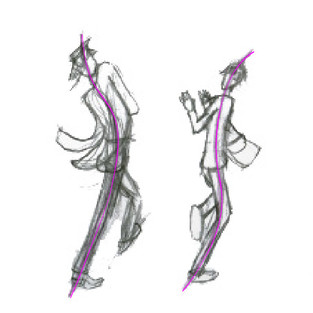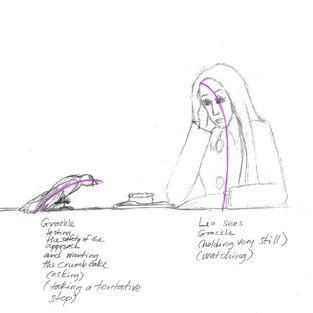Art Notes: Using Line of Action as a Storytelling Device
- Anne Ross
- Jul 31, 2020
- 2 min read
Updated: Jun 3
In my vintage copy* of Preston Blair’s Animation: Learn How to Draw Animated Cartoons, I happened across this interesting passage on page 5:
LINE OF ACTION
AN IMAGINARY LINE EXTENDING THRU [sic] THE MAIN ACTION OF THE FIGURE IS THE “LINE OF ACTION” - - PLAN YOUR FIGURE AND IT’S [sic] DETAILS TO ACCENTUATE THIS LINE - - BY SO DOING YOU STRENGTHEN THE DRAMATIC EFFECT - - THE FIRST THING TO DRAW WHEN CONSTRUCTING A FIGURE IS THE LINE OF ACTION - - THEN BUILD OVER THAT.
Blair’s embedded note—“YOU STRENGTHEN THE DRAMATIC EFFECT”—suggests that (1) the line of action (LOA) is specifically a storytelling device, and (2) it can more or less be calculated in advance as such, even when only a sense (or gist) of the character interaction is available to work with initially.
In fact, wherever one character interacts with another, the specific placement of their two lines of action relative to each other, as well as the “emotion” each LOA carries (emotion represented in its simplest form, in a drawn line), produces a matching sense of dramatic action. (Here, I'm relying on the storyteller’s axiom that “activity does not equal action,” and that “action” means “dramatic action.”)

In a storytelling sense, LOAs also have the added bonus of being able to embody purposes. Further, they possess the properties of orientation and direction.
With respect to dramatic action, the LOA tends to coincide with where the viewer’s eye is supposed to travel next, subtly giving the viewer a “glimpse of the future.” Of course, although that line usually passes through the character's head, I've learned it won’t always.
A key to implementing these insights may be to focus on LOAs’ contrasting qualities—such as their relative concavities and convexities and their relationship to the center of gravity (COG)—in order to help the viewer more readily identify the underlying dramatic relationship.
*FYI, the book is one of those undated no-ISBN large-format Walter T. Foster publications I picked up at a used-book sale. It cost me 50 cents, original cover price $2.00, and it’s all of 40 pages long. A currently available update, which contains much of the same content as the original, is the 224-page Cartoon Animation by Preston Blair, ISBN 13: 978-1-56010-084-3 or ISBN 10: 1-56010-084-2.















Comments